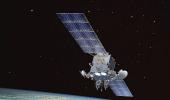'This may open up doors for private players in India to collaborate with global players in commercial missions.'

India became the 27th country on June 21 to sign the Artemis Accords, opening up fresh co-operation between the National Aeronautics and Space Administration (NASA) and the Indian Space Research Organisation (ISRO) in space exploration.
According to industry experts, this is likely to aid India's private sector space players to expand their presence globally, giving a push to its efforts to increase the country's share in the global space economy.
Based on government estimates, India's share in the global space economy of $360 billion is hardly around 2 per cent.
Both NASA and ISRO have also decided to have a joint mission to the International Space Station or ISS in 2024. According to sources, the details of this decision will be worked out between both the organisations in future meetings.
A government source said that the future of space missions is more dependent on collaborations, especially science missions to the moon and beyond due to its exorbitantly high cost.
"This may also open up doors for private players in India to collaborate with global players in commercial missions," he added.
"A large lunar economy will get triggered by the Artemis Accords, helping India and Indian private players participate," said A K Bhatt, Director General, Indian Space Association (ISpA).
NASA and Isro are developing a strategic framework for human spaceflight cooperation this year.
The Artemis programme has been lined up by NASA and other countries with an aim to return humans to the Moon by 2025 and expand space exploration to Mars and beyond.
The Artemis Accords is a non-binding agreement between the US government and other governments involved in the programme, which was launched by the US in 2017 with the aim of sending the first woman and the next man to the Moon.

"It is quite positive for the space agencies, as a lot of private ventures in the US are also aiming for the moon. I think we will see a lot of Indian industry supporting some of those missions," said Sanjay Nekkanti, founder, Hyderabad-headquartered Dhruva Space, one of India's first exclusively space focussed startups.
"Instead of having a buying and selling kind of relationship, a much larger bond can be established," he added.
This comes at a time when the space tourism concept is also gathering momentum.
At present, companies such as Virgin Galactic, SpaceX, Blue Origin, Orion Span, Boeing, Space Adventures and Zero 2 Infinity are in the space tourism sector globally.
According to data shared by ISpA, as many as 13 tourists have visited the International Space Station since 2001, while 27 have had suborbital rides so far, through various companies.
"This is by far the biggest exploration of the moon and beyond, after Apollo 11 by America. Artemis 1 has already taken place in November successfully, though after a little delay," said Bhatt.
"Artemis 2 will be an exploration again with the launch vehicle beyond the moon. Artemis 3 is already planned by 2025 and would send four astronauts around the moon and out of this, two may land on the moon."

Feature Presentation: Ashish Narsale/Rediff.com











